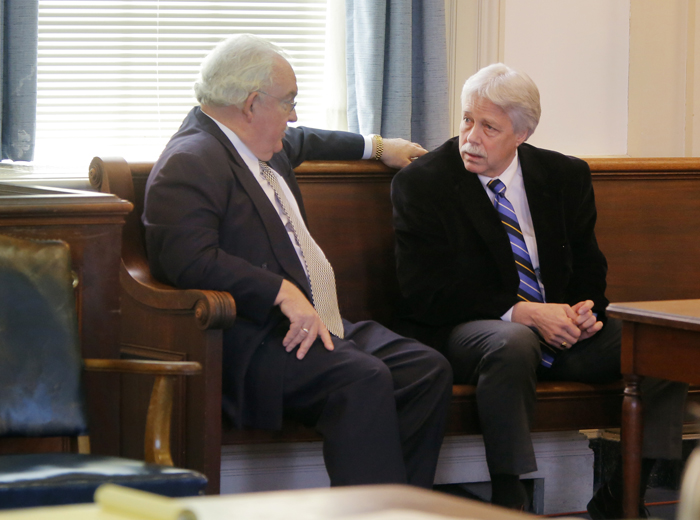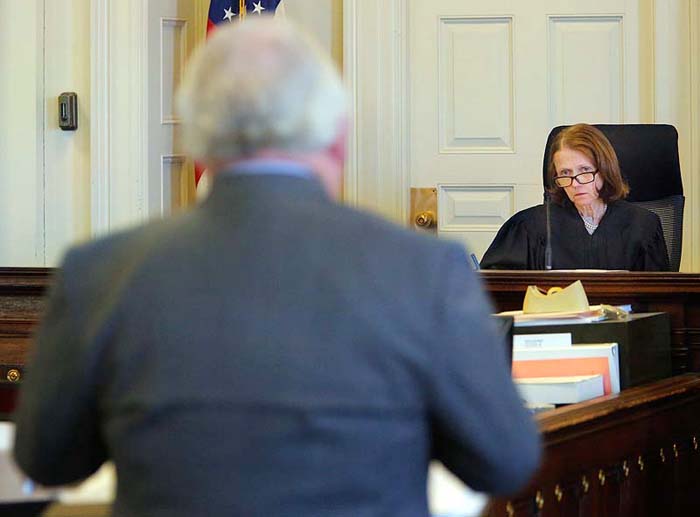ALFRED — The highly anticipated trial of Mark Strong Sr. in the Kennebunk prostitution case may have been derailed Friday, when the judge dismissed 46 of the 59 counts against him and prosecutors called for the trial to be halted while they appealed the decision.
On Friday morning, Superior Court Justice Nancy Mills granted a motion by Strong’s attorneys to dismiss 46 counts of violation of privacy against him.
Prosecutors moved to appeal the dismissal before proceeding with the trial, the first of a key defendant in a case that has drawn international attention.
Strong, 57, of Thomaston, is accused of conspiring with Alexis Wright to run a one-woman prostitution business from Wright’s Zumba studio in Kennebunk.
Some of the charges accused him of invading the privacy of Wright’s alleged customers by videotaping their encounters with her.
Strong’s attorney, Daniel Lilley, filed a motion Thursday to dismiss those charges, arguing that people who break the law by paying for sex can’t have an expectation of privacy.
Mills agreed, saying in her ruling, “These patrons may have had a subjective expectation of privacy, but I can’t find an objective expectation of privacy that society would be willing to accept.”
The 13 remaining charges against Strong involve promotion of prostitution and conspiracy to promote prostitution.
The lead prosecutor in the case, York County Deputy District Attorney Justina McGettigan, immediately called for a recess after the judge’s ruling, called the state Attorney General’s Office and sought to stop the trial when court resumed.
Lilley said there is no reason to halt the proceedings.
“My client can’t stand another six to 12 months of publicity,” he said. “He has a constitutional right for the trial. The state doesn’t have a constitutional right to appeal or any of the other shenanigans they’re pulling now.”
Lilley asked the judge to seek intervention from the Maine Supreme Judicial Court to salvage the jury pool and the jury selection that has been conducted.
On Thursday, the state supreme court ordered a stop to the jury selection process, which had been conducted in secret since Tuesday, in response to a motion from the Portland Press Herald challenging the constitutionality of Mills’ decision to bar the public and the media from the proceedings.
Mills said Friday that she would take no further action on the case, pending the prosecution’s appeal. She did give instructions to have the jury pool retained until next week.
She let the potential jurors leave for the day, with instructions to call after 5 p.m. Sunday to learn whether they will have to appear in court Monday morning.
Lilley and Strong spoke to the media outside York County Superior Court after court adjourned for the day.
“I really don’t have any feeling right now. I’ve been kind of numb for a period of time now,” Strong said. “I just want this to move on so I can move on.”
Lilley said he would file a request with the supreme court by the end of Friday asking the court to rule on Strong’s right to a speedy trial.
“We hope that the Law Court will take this on in an emergency basis, and we’ll have a trial come Monday. This has been going on long enough,” Lilley said. “I think that justice requires my client get his trial and get it soon.”
McGettigan filed her appeal of Mills’ decision early Friday afternoon.
Lilley and his co-counsel, Tina Nadeau, filed their motion to the court later in the day, requesting rejection of the prosecutors’ appeal and suspension of the rules to allow Strong his trial.
“Now that 70 percent of (the prosecutors’) case was dismissed, they’re getting cold feet,” Lilley said, speaking by phone as he worked on the motion. “As we say in Maine, ‘Fish or cut bait.'”
In their motion, Lilley and Nadeau cited the Press Herald’s appeal to the supreme court.
“The Constitutional rights of Appellee Strong are of no lesser importance than those of the media in this case: every minute, every hour, every day that goes by with a juror pool sitting idly, denies Appellee Strong the rights to which he is entitled and which he asserts forcefully through these tortuous proceedings,” the motion says.
McGettigan filed a response to that motion, providing counter arguments to each point.
She wrote that Mills’ dismissal of the 46 counts against Strong poses a “serious impairment” to the prosecution of the case, so there are legal grounds for granting her appeal.
By the end of Friday, the supreme court had not scheduled a time to take up the prosecution’s appeal or the defense’s motion.
Wright, 30, of Wells, has pleaded not guilty to 106 counts, including promotion of prostitution, engaging in prostitution, violation of privacy, conspiracy, tax offenses and receiving welfare benefits when ineligible. She faces 46 counts of violation of privacy, the same number as Strong.
Wright’s attorney, Sarah Churchill, said Friday that she likely would have asked the judge to dismiss those charges against her client as well.
Churchill said Mills’ decision Friday bodes well for Wright, because Mills will also preside over Wright’s trial. “With regards to violation of privacy, the clients are similarly situated,” Churchill said.
Wright’s trial is scheduled for May, although Churchill said there is a chance that a plea agreement will be reached before then. Churchill has until March 26 to file pretrial motions.
Asked whether it could be difficult to seat an impartial jury for her client’s trial, as it has been for Strong’s, Churchill said it is a concern.
“A lot of times, there is a great deal of media coverage initially, but then a big lull until the trial, so it’s easier to find jurors who aren’t familiar with the case,” she said. “That hasn’t been the experience here.”
The case has drawn so much attention in part because Wright is suspected of keeping a meticulous list of more than 150 names of customers, including prominent figures. Sixty-six have been charged and 18 have pleaded guilty and been convicted of engaging a prostitute.
E. Jim Burke, a professor at the University of Maine School of Law, said he cannot predict how the supreme court will come down on the latest appeal because the entire case has been unpredictable.
Burke said it is rare for the court to be asked to intervene in a case before it is decided, let alone twice.
If the supreme court allows Strong’s trial to go forward, jury selection will have to be completed.
After three days of jury selection behind closed doors, the lawyers have yet to reduce the pool to about 30 potential jurors. At that point, they can use a limited number of challenges to select 12 jurors and as many as four alternate jurors.
Staff Writer Scott Dolan can be contacted at 791-6304 or at:
sdolan@pressherald.com
Staff Writer Eric Russell can be contacted at 791-6344 or at:
erussell@pressherald.com
Send questions/comments to the editors.




